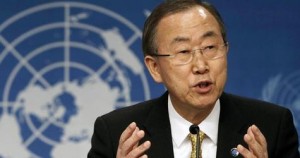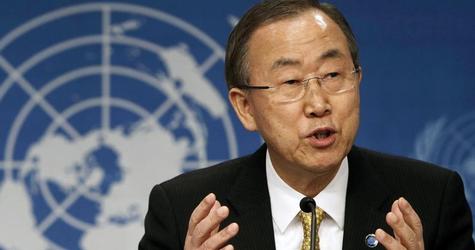Reuters
By Aziz El Yaakoubi
and Louis Charbonneau

Morocco’s government has accused U.N. Secretary General Ban Ki-moon of dropping his neutrality in the Western Sahara conflict by using the word “occupation” to describe Morocco’s presence in the region.
The United Nations responded by dismissing the suggestion that Ban was anything but neutral in the long-running dispute over the desert region in the northwest corner of Africa that has festered since Morocco took control over most of it in 1975 following former colonial power Spain’s withdrawal.
“The kingdom of Morocco has noticed … the Secretary General has dropped his neutrality and impartiality and has showed a guilty indulgence with a puppet state without attributes, territory, population, nor a recognized flag,” said a Moroccan government statement carried by state news agency MAP late on Tuesday.
The Polisario Front, which has said the territory belongs to ethnic Sahrawis, waged a guerrilla war until a U.N.-brokered ceasefire in 1991. But the two sides have been deadlocked since, particularly over a referendum on the region’s future.
Ban said last week he would restart U.N. efforts to reach a solution after visiting camps in southern Algeria for the Polisario Front leadership and refugees who fled the conflict.
The Moroccan government said Ban had used the word “occupation” to describe Moroccan annexation of Western Sahara in 1975.
“The use of such terminology has no legal nor political basis and it is an insult to the Moroccan government and people,” the government statement said.
U.N. spokesman Farhan Haq, responding to a question about Morocco’s criticism, told reporters in New York that the U.N. stance had not changed.
“The secretary-general believes that he and the United Nations are neutral parties,” Haq said, adding that Ban wants to make sure in his final year as U.N. chief that the Western Sahara issue was “firmly on the international agenda.”
Haq said Ban was still planning to visit Morocco later this year and his office remained in contact with the Moroccan government.
The U.N. press office issued a further statement that said Ban had “referred to ‘occupation’ as related to the inability of Sahrawi refugees to return home under conditions that include satisfactory governance arrangements under which all Sahrawis can freely express their desires.”
Polisario, backed by Morocco’s regional rival and neighbor Algeria and a number of other African states, wants to hold the vote promised in the ceasefire deal on the region’s fate.
Morocco says it will not offer more than autonomy for the region, rich in phosphates and possibly offshore oil and gas.
Polisario’s self-declared Arab Sahrawi Republic (SADR) has been recognized by some countries, mainly from the African Union. None of the Western powers recognize it.
(Reporting By Aziz El Yaakoubi in Rabat and Louis Charbonneau in New York; Editing by Will Dunham and Lisa Shumaker)







